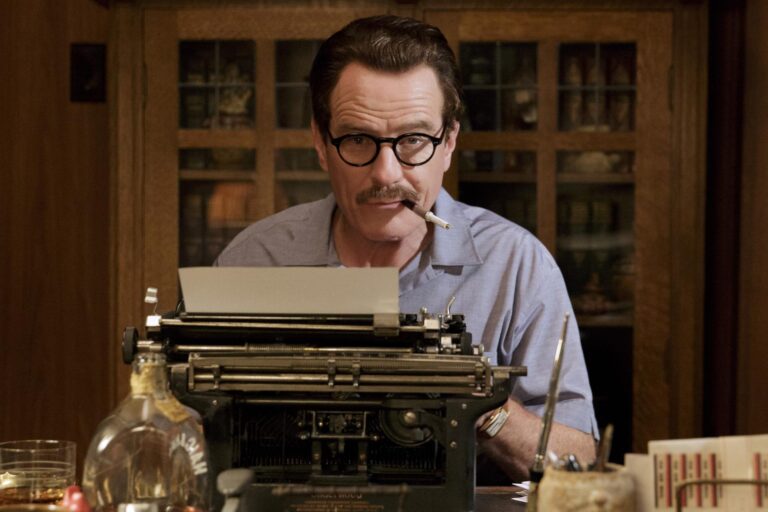Dalton Trumbo was one of the most fascinating writers to ever work in Hollywood. A filmmaker would have to go out of their way to make a movie about his life that wasn’t at least intriguing. Jay Roach’s Trumbo is indeed an intriguing picture, although it’s never flat-out brilliant. The film does capture Trumbo’s spirit and everything he stood for, ultimately doing him justice. Seeing how the real Trumbo won two Academy Awards for his screenwriting, however, one can’t help but wish that this biopic would exemplify the same level of storytelling.
Bryan Cranston plays Trumbo, who’s either smoking a cigarette or typing up a storm in every other scene. Although he’s one of the hottest screenwriters in the business, Trumbo is targeted as a communist and shunned by the community. Eventually, he’s blacklisted and imprisoned along with several other communist writers, including Louis C.K. in a strong performance as Arlen Hird. After that, Trumbo continues to write screenplays under different names, winning Oscars for Roman Holiday and The Brave One. Since he can’t take credit for his work, though, Trumbo can’t receive the recognition or compensation he deserves.
Cranston brings zealous energy to his performance, depicting Trumbo as a man who refuses to give up his beliefs or passion in life. There are moments where it almost seems like Cranston is going to go too over-the-top, but he restrains himself just enough to remain grounded and convincing. The supporting cast is just as seamless in their roles. We get some dead-on portrayals from David James Elliott as John Wayne, who was one of the most outspoken anti-communists, Helen Mirren as Hedda Hopper, a journalist known for naming names, and Michael Stuhlbarg as Edward G. Robinson, an actor too afraid to go public with his political views. Plus, how can you go wrong with John Goodman as a foul-mouthed studio head?
While the cast is mostly first-rate, a few characters don’t really go anywhere. There are subplots involving a feud with an intolerant neighbor and Adewale Akinnuoye-Agbaje as a prison inmate that didn’t really need to be included. One subplot that could’ve used more focus was Trumbo’s relationship with his family. Diane Lane is virtually cast aside as Trumbo’s wife, excluding one memorable conversation. The only dynamic that’s really studied is Trumbo’s rapport with his neglected daughter (Elle Fanning), but even that could have dug a little deeper.
That’s essentially what holds Trumbo back from greatness. John McNamara’s screenplay presents all the facts, but could have been a much richer character study if it examined its subject closer. With that said, this is still a highly interesting and important story about one of Hollywood’s darkest eras. At the center of it was a man willing to stand up for free speech, separating an artist from the art. This film effectively and entertainingly conveys the morals Trumbo embodied.
There’s a point where our title character talks about an early draft of Spartacus with Kirk Douglas (Dean O’Gorman). It’s noted that the screenplay doesn’t entirely work, but there’s a potentially strong movie somewhere in it. With another rewrite, Trumbo might have been elevated from a good movie to a terrific one. As is, though, this a fun, absorbing picture that Dalton Trumbo would have been gratified to put his name on.
With another rewrite, Trumbo might have been elevated from a good movie to a terrific one. As is, though, this a fun, absorbing picture that Dalton Trumbo would have been gratified to put his name on.
-
Score7



